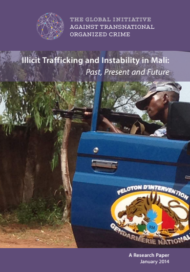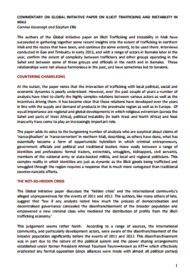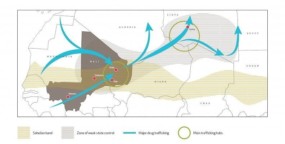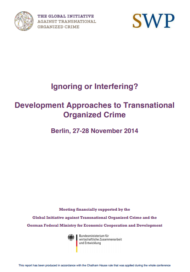Posted on 27 Jan 2014
The Global Initiative is pleased to release this first research report “Illicit Trafficking and Instability in Mali: Past, present and future“, which is an in-depth review of how illicit trafficking has evolved in Mali, and the impact that it has had on both the governance and development prospects for the country and the wider Sahel region.
Stretched out along the Sahelian band are some of the poorest and most fragile countries on earth with human security challenges that transcend borders: climate change, regional food crises, rapid population growth, weak governments, endemic corruption, internal conflict and violent extremism.
From the Atlantic to the Mediterranean, arms, consumer goods, and people flow freely due to weak state structures overlaid by closely connected communities and networks. Long and porous borders, low population density, and the challenges of surveillance in this vast space have made the Sahel region vulnerable to organized crime and illicit trafficking.
Land-locked at the heart of this zone of fragility is Mali, with the Sahelian band cutting across the middle of her territory. With an estimated population of 12.7 million, a life expectancy of 51 years, and a ranking on the Human Development Index of 182 out of 186, the citizens of the Malian state are some of the most vulnerable in the world.
Illicit trafficking has defined the nature of the political crisis in Mali in the immediate past. Yet the nature of how trafficking interacted with local political, social and economic dynamics is poorly understood. A better comprehension of these dynamics is essential to designing an effective response to peace building, state consolidation and development.
The goal of this paper is to take a systematic review of the evolution of illicit trafficking in Mali, from its trading roots to its current form today. In doing so, the study seeks to:
- examine the way in which trafficking has entrenched itself into the Malian ethnography,
- to understand the socio-cultural and economic dynamics driving and protecting the trade;
- to understand the way in which the illicit economy has engaged with the political and state-building process, and
- to anticipate its likely impact in the current peacebuilding framework.
This report on Mali is the first in a series of research studies by the Global Initiative that draw on original fieldwork to better understand how organised crime and illicit trafficking engages with governance, development and state fragility.




